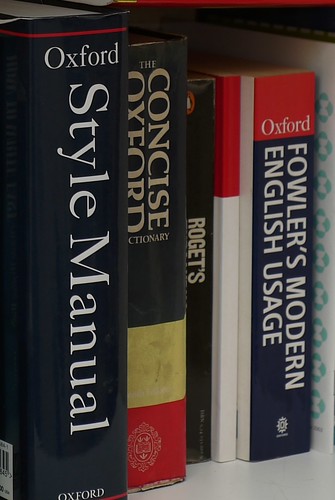Just because I love technology and spend a lot of time on the web, and writing for the web, doesn’t mean I’ve eschewed books. I still use books extensively (and intensively) for my writing. Not any books either, but ones written or contributed to by experts.
I think if you’re serious about writing you don’t want to be messing about with so-called “crowd-sourced” information, which may or may not be correct. To take an offline example, the fact that many people use the word “implied” when what they actually mean is “inferred”, or vice-versa, doesn’t make their usage correct.
 Afew of the books I find usefulThe photo shows a selection of the reference books I’ve acquired. Interestingly, the most useful of these, by dint of being the most up-to-date, is the one with nothing on the spine. That’s The Economist’s Style Guide. Roget’s Thesaurus comes a close second.
Afew of the books I find usefulThe photo shows a selection of the reference books I’ve acquired. Interestingly, the most useful of these, by dint of being the most up-to-date, is the one with nothing on the spine. That’s The Economist’s Style Guide. Roget’s Thesaurus comes a close second.
For a dictionary, the one shown is fine for many purposes. Better is the Shorter Oxford Dictionary, which resides in a different room in the house. That was a free gift for joining a mail order book club many moons ago. The best by far is the online edition of the full Oxford English Dictionary, one of the reference works to which I have free access, courtesy of my local library service.
Fowler’s Modern English Usage is wonderful, but language evolves, and there is advice in this book which is looking rather dated. I ought to see if there is a later edition available. (The copy I have was reprinted in 1996, but was last revised in 1983.)
The Oxford Style Guide is composed of two sections, a reference section and a writers’ dictionary. The former covers such potentially thorny issues as capitalisation, whilst the latter specialises in words likely to be of interest to the writer, such as parts of speech, and items likely to be too esoteric for inclusion in a more general dictionary. For example, opening the book at random, I’ve come across this entry:
Ashby de la Zouch Leics (no hyphens)
Thus, if I needed to include that place name in a story or article, this dictionary would tell me where it actually is (Leicestershire, England), and also that the name isn’t hyphenated (which, for a name like this, is somewhat counterintuitive).
What reference books do you use?
